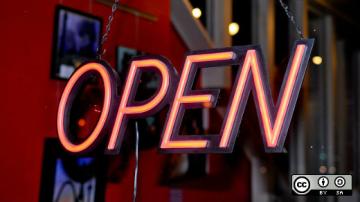The Open Source Initiative (OSI) is the community-driven nonprofit organization that maintains and evaluates compliance with the Open Source Definition. Last year, I wrote a piece for Opensource.com with a series of questions for candidates in the 2020 election for the OSI board of directors. Several candidates answered on the OSI wiki, which I appreciated and used to help guide my vote as a member.
A year later, a new election is upon us, and it seems like a great time to check in on my questions and see what they tell us about OSI's year.
Big changes on big questions
OSI has managed to have a steady and successful year, despite the challenges of 2020–2021. In particular, OSI has answered a couple of my questions through action—not just talking the talk but also walking the walk.
My first question for last year's candidates was: If OSI could only do one thing, what would it be? Very recently, the organization answered that question by publishing an updated mission statement. A new mission statement might seem like a small thing, but it is big in a couple of ways. First, as I said last year, there are a lot of different answers to the question "what is OSI for?"—and those different answers have been a source of tension both within and outside the organization. The new mission statement doesn't narrow things down to "just one thing," but it does center stewardship of the Open Source Definition as "the foundation of our ecosystem." That's a welcome focus.
In late 2020, the organization also announced it intended to hire an executive director for the first time, with long-term plans to have two to three other employees. This answers my second question last year (Should OSI move towards a board that…does less on a day-to-day basis?) with a resounding "yes." While I did (and still do) see the potential case for a small, board-driven organization, overall, I think this is very much the right move for OSI. It will help the board stay high-level while making key initiatives more effective.
Still working in a changing world
Two of the questions I asked last year are still very pertinent, and I'd ask them of any new candidates this year.
-
What should OSI do about the tens of millions of people who regularly collaborate to build software online (often calling that activity, colloquially, open source) but have literally no idea what OSI is or what it does?
This is still pertinent, as the growth of open source projects increased during the pandemic. OSI has started to think harder about this, in part through its first online conference this year, the State of the Source. But with open source continuing to sprawl, every board member should have a coherent theory of what OSI should do about this. -
If an Ethical Software Initiative sprung up tomorrow, what should OSI's relationship to it be?
Welp, it did spring up, in January 2021. OSI, as best as I can tell, hasn't publicly acknowledged the group's existence. That seems to me to be…less than ideal. Unpleasant personal politics between the Free Software Foundation (FSF) and OSI made it hard for those organizations to work together for years, damaging both of their causes. OSI should learn from this. If nothing else, a healthy arms-length relationship between OSI and ethical source organization(s) would tend to foster constructive disagreement—something sorely needed. How will new (or returning) board members handle this in the next term?
The new challenges
In an organization that has recommitted to the centrality of the Open Source Definition, questions of how to interpret that definition will continue to be paramount. This is particularly true for the board, whose members generally don't sign up to read licenses but nevertheless are the final arbiters of licensing decisions.
This would be true even if nothing else were going on in the world, but instead, we seem to be dealing with a resurgence of companies running a "rights ratchet," where ever-more-restrictive open or quasi-open licenses are foisted on existing user bases in the name of openness and (arguably) exploiting vagueness in the Open Source Definition.
So, the two questions I'd add for the current candidates are:
-
When a license decision involves a topic on which the Open Source Definition is vague or otherwise unhelpful, what should the board do?
For example, the OSD does not specify that it must be easy, reasonable, or even possible to comply with innovative copyleft restrictions. What should happen in this situation? Do we give the benefit of the doubt to a license submitter? Does it depend on who the submitter is? Should we update an FAQ or otherwise adjust the OSD? Defer to the licensing committee or license review? Or do nothing at all? This is a fraught question, so I don't envy the board. But it is nevertheless part of the board's core role. (This is in some ways a more focused version of a question I asked last year: "If OSI has to choose between being an agent of change and a stabilizing force, which should it prefer?") -
What role should the new staff play in license evaluation (or the OSD more generally)?
There are a variety of ways that staff could support the license-review process (like adding tooling or summarizing discussions). There are probably also quite a few reasons why staff should stay out of the process altogether, such as a desire to center community decision making. Given the plan to add staff and the renewed centrality of the OSD, what do the board candidates think the relationship between the two should be? Hands off? Deeply involved? Focused elsewhere?
Good people, hard jobs
Finally, as with all nonprofit board roles, the question of "you have 24 hours in the day and are talented enough to do many different things; why do you want to give some of those hours to OSI?" is every bit as pertinent as it was last year. Thankfully, the board has stabilized with no resignations this (very tough!) year. Nevertheless, I expect the candidates will face hard choices about their time in 2021–2022, and it is fair to ask how they plan to prioritize.
I look forward to candidates' responses. The OSI remains important for all of us, and the quality of candidates always reflects that—surely one of the better (if small) signs of the continued success and health of open source overall.





Comments are closed.